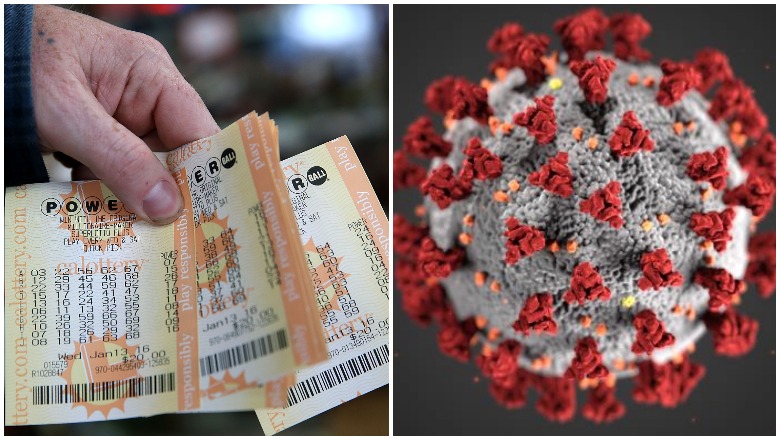
Getty Powerball vs COVID odds
The Powerball jackpot is growing. As of January 13, 2021, the Powerball lottery is worth $550 million before taxes. But your chances of winning the Powerball are pretty slim. In fact, if you’re wondering how your odds of dying of COVID-19 stack up against your odds of winning the Powerball jackpot, there’s some bad news. Your odds of dying of COVID-19 right now are greater than your odds of winning Powerball.
Here Are Your Odds of Dying of COVID-19
Unlike Powerball, the odds of dying of COVID-19 can vary pretty widely. It depends on your age and risk factors, for example. But the odds also vary depending on your access to health care.
The New York Post reported that at the current time, Americans in general have a 1-in-1,000 chance of dying of COVID-19 within the next six months. This was shared by Dr. Steven Goodman, associate dean at Stanford’s School of Medicine, during an FDA hearing. This was based on about 285,000 deaths from COVID-19 in the U.S. over the last seven months, averaging about 1,000 deaths a day.
Goodman explained that the 1-in-1,000 chance applied to a random U.S. citizen’s average risk over six months. But he added that this varies widely by individual.
You can get a better idea of your specific odds using an online calculator developed by Johns Hopkins Bloomberg School of Public Health, Miami Herald reported. The calculator looks at specific risk factors, but it doesn’t include everything, such as high-exposure occupations like working in a grocery store or working as a nurse or firefighter. Personal behavior also can’t be accounted for in the calculator.
This calculator looks at data from the CDC and from the UK and reviews your risk compared to the average U.S. population risk. You can view the calculator here.
For a test, Heavy looked at a relatively healthy, young person with no risk factors, assuming someone was a white woman, 5’7″, 130 pounds, 25-years-old, never smoked, and had no pre-existing conditions. Their risk was calculated to be close to or lower than average at .02. The hypothetical person was put as living in Texas, which estimated their risk of dying from COVID-19 at 2.3 per 1,000,000.
Your Chance of Winning Powerball
Your chance of winning the Powerball jackpot is pretty small. According to Powerball, your odds of winning the entire jackpot are about 1 in 292.2 million. Your odds of winning $1 million by matching five white numbers are 1 in 11.6 million. Your odds of matching four white numbers and the Powerball (and winning $50,000) are much better, standing at 1 in 913,129. Your odds of matching four white balls and winning $100 is 1 in 36,525 (or 1 in 14,494 if she matches three numbers and the red Powerball.)
You Have a Greater Chance of Dying of COVID-19 than Winning the Powerball Jackpot
In conclusion, your odds of dying of COVID-19, even for the healthiest person, are higher than your odds of winning the Powerball jackpot. An average healthy woman in her mid-20s in Texas currently is estimated as having a .000023% chance of dying according to the Johns Hopkins calculator, which is still higher than her chance of winning the Powerball jackpot. She does, however, have a .0000109513% chance of winning $50,000, which is a little closer in odds.
The good news is that she has a greater chance of winning $100 than she does of dying of COVID-19, with .000273% or .0006899% versus .000023% chance of dying.
Dr. Mike Ryan, executive director of the WHO’s Health Emergencies Program, told Newsweek that without a vaccine, you also have a much greater chance of catching coronavirus than winning the lottery. He said: “From that perspective, think of your chances of winning the lottery. When you look at your chances of being involved in an accident, if you look at many of the life risks we face, this is a significant issue.”
There’s some good news, though. Deaths from coronavirus are decreasing compared to the beginning of the pandemic. So your odds of dying from coronavirus now are definitely lower than they were at the beginning of the pandemic, Newsweek reported. This is in part because there are better treatments for patients now.
READ NEXT: The latest COVID-19 deaths, cases, and updates